Employment at Will vs. Affirmative Action: A Legal Analysis
VerifiedAdded on 2023/05/31
|7
|1877
|335
Essay
AI Summary
This essay provides a critical analysis of employment at will and affirmative action, examining the advantages and disadvantages of each concept within the framework of U.S. labor law. Employment at will, defined as the ability of an employer to terminate employment without cause, is discussed in terms of its flexibility and potential drawbacks like job insecurity and financial stress for employees. Affirmative action, which involves preferential treatment for minority groups with a history of discrimination, is explored regarding its role in promoting diversity and addressing historical inequalities, as well as potential disadvantages such as reverse discrimination. The essay references relevant court cases and scholarly perspectives to offer a balanced view of both employment at will and affirmative action, concluding that both concepts present significant advantages and disadvantages for employers and employees alike. Desklib offers this essay and other solved assignments to aid students in their studies.

Running head: LAW
Law
Name of Student
Name of University
Author Note
Law
Name of Student
Name of University
Author Note
Paraphrase This Document
Need a fresh take? Get an instant paraphrase of this document with our AI Paraphraser
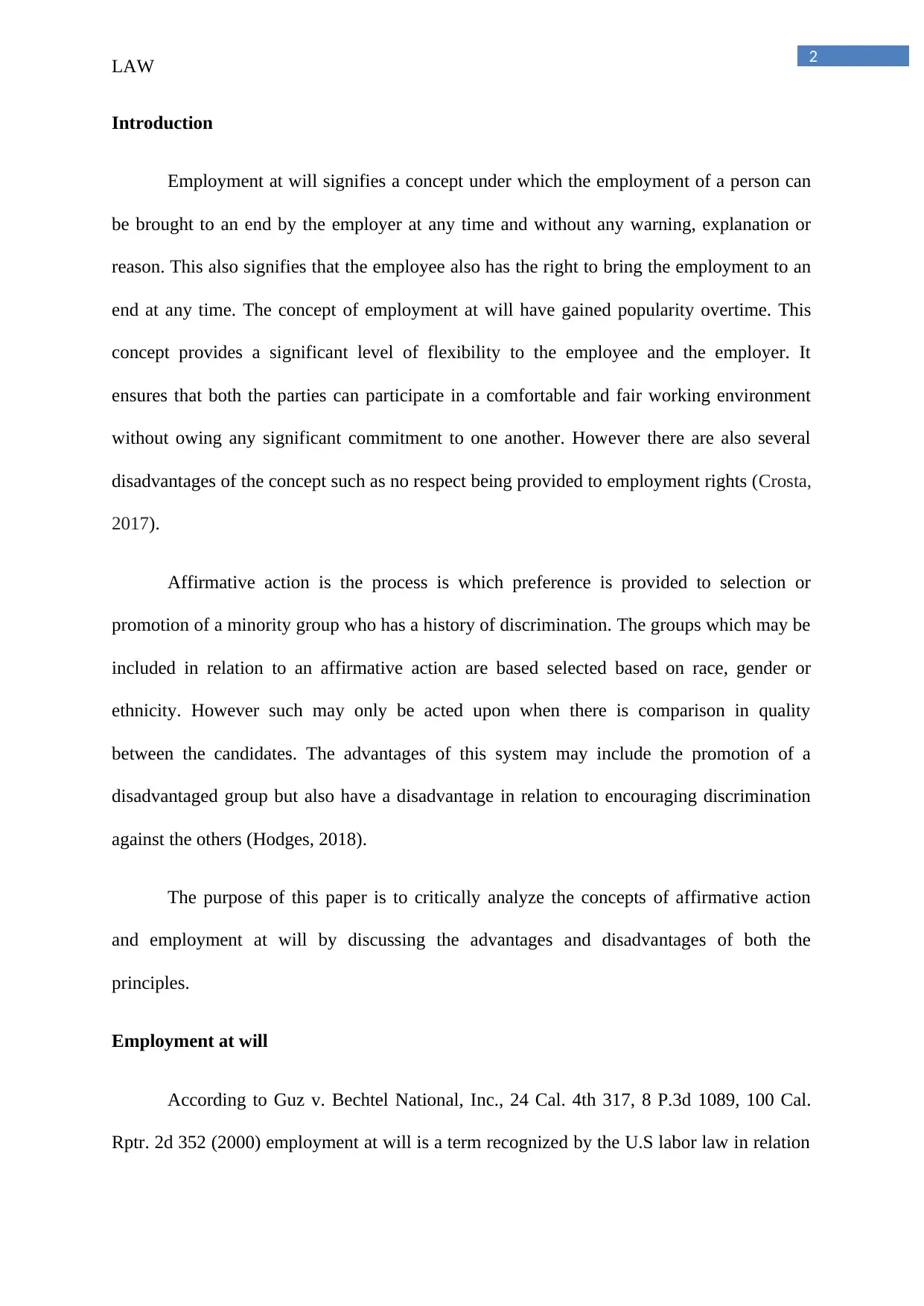
2
LAW
Introduction
Employment at will signifies a concept under which the employment of a person can
be brought to an end by the employer at any time and without any warning, explanation or
reason. This also signifies that the employee also has the right to bring the employment to an
end at any time. The concept of employment at will have gained popularity overtime. This
concept provides a significant level of flexibility to the employee and the employer. It
ensures that both the parties can participate in a comfortable and fair working environment
without owing any significant commitment to one another. However there are also several
disadvantages of the concept such as no respect being provided to employment rights (Crosta,
2017).
Affirmative action is the process is which preference is provided to selection or
promotion of a minority group who has a history of discrimination. The groups which may be
included in relation to an affirmative action are based selected based on race, gender or
ethnicity. However such may only be acted upon when there is comparison in quality
between the candidates. The advantages of this system may include the promotion of a
disadvantaged group but also have a disadvantage in relation to encouraging discrimination
against the others (Hodges, 2018).
The purpose of this paper is to critically analyze the concepts of affirmative action
and employment at will by discussing the advantages and disadvantages of both the
principles.
Employment at will
According to Guz v. Bechtel National, Inc., 24 Cal. 4th 317, 8 P.3d 1089, 100 Cal.
Rptr. 2d 352 (2000) employment at will is a term recognized by the U.S labor law in relation
LAW
Introduction
Employment at will signifies a concept under which the employment of a person can
be brought to an end by the employer at any time and without any warning, explanation or
reason. This also signifies that the employee also has the right to bring the employment to an
end at any time. The concept of employment at will have gained popularity overtime. This
concept provides a significant level of flexibility to the employee and the employer. It
ensures that both the parties can participate in a comfortable and fair working environment
without owing any significant commitment to one another. However there are also several
disadvantages of the concept such as no respect being provided to employment rights (Crosta,
2017).
Affirmative action is the process is which preference is provided to selection or
promotion of a minority group who has a history of discrimination. The groups which may be
included in relation to an affirmative action are based selected based on race, gender or
ethnicity. However such may only be acted upon when there is comparison in quality
between the candidates. The advantages of this system may include the promotion of a
disadvantaged group but also have a disadvantage in relation to encouraging discrimination
against the others (Hodges, 2018).
The purpose of this paper is to critically analyze the concepts of affirmative action
and employment at will by discussing the advantages and disadvantages of both the
principles.
Employment at will
According to Guz v. Bechtel National, Inc., 24 Cal. 4th 317, 8 P.3d 1089, 100 Cal.
Rptr. 2d 352 (2000) employment at will is a term recognized by the U.S labor law in relation
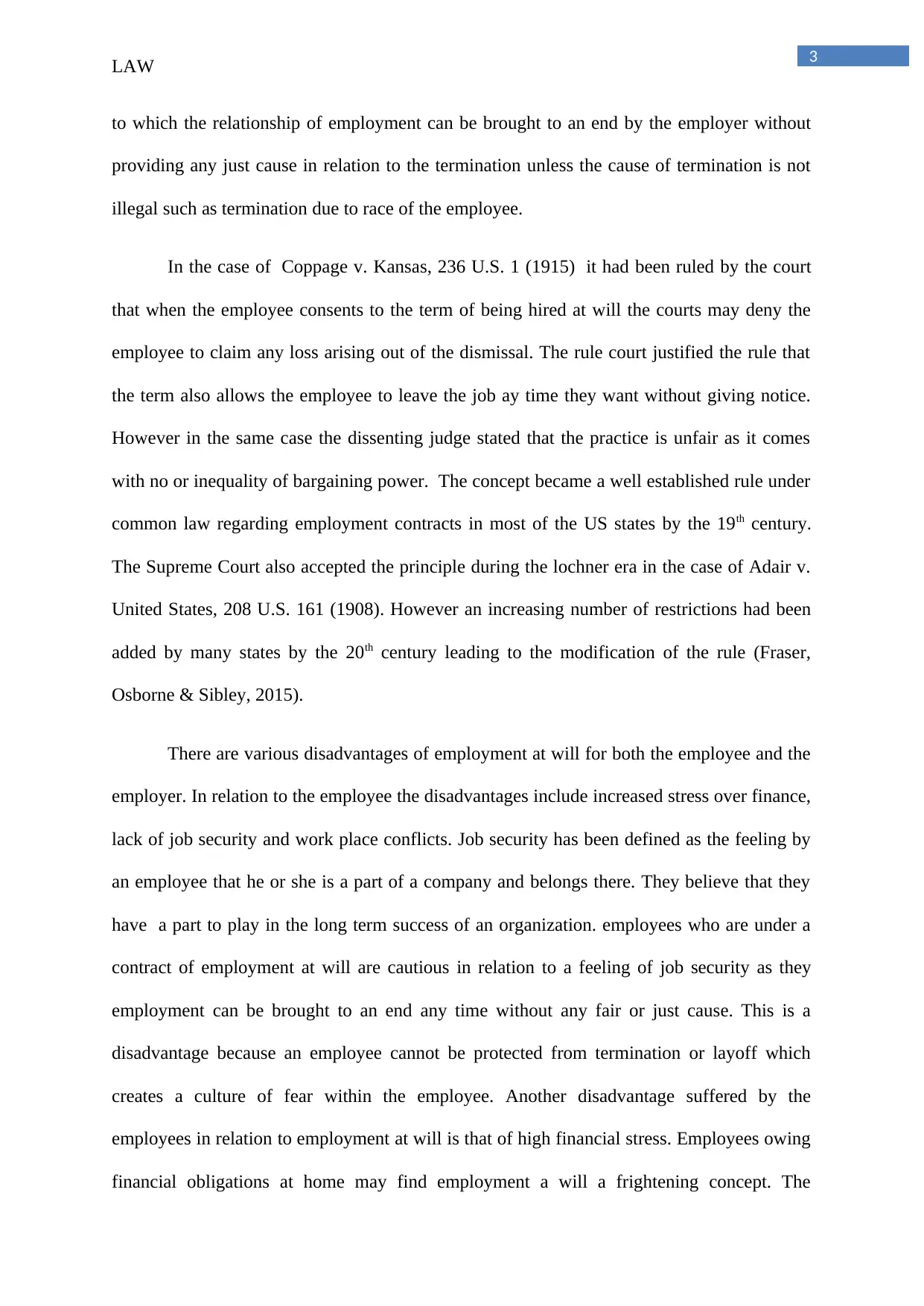
3
LAW
to which the relationship of employment can be brought to an end by the employer without
providing any just cause in relation to the termination unless the cause of termination is not
illegal such as termination due to race of the employee.
In the case of Coppage v. Kansas, 236 U.S. 1 (1915) it had been ruled by the court
that when the employee consents to the term of being hired at will the courts may deny the
employee to claim any loss arising out of the dismissal. The rule court justified the rule that
the term also allows the employee to leave the job ay time they want without giving notice.
However in the same case the dissenting judge stated that the practice is unfair as it comes
with no or inequality of bargaining power. The concept became a well established rule under
common law regarding employment contracts in most of the US states by the 19th century.
The Supreme Court also accepted the principle during the lochner era in the case of Adair v.
United States, 208 U.S. 161 (1908). However an increasing number of restrictions had been
added by many states by the 20th century leading to the modification of the rule (Fraser,
Osborne & Sibley, 2015).
There are various disadvantages of employment at will for both the employee and the
employer. In relation to the employee the disadvantages include increased stress over finance,
lack of job security and work place conflicts. Job security has been defined as the feeling by
an employee that he or she is a part of a company and belongs there. They believe that they
have a part to play in the long term success of an organization. employees who are under a
contract of employment at will are cautious in relation to a feeling of job security as they
employment can be brought to an end any time without any fair or just cause. This is a
disadvantage because an employee cannot be protected from termination or layoff which
creates a culture of fear within the employee. Another disadvantage suffered by the
employees in relation to employment at will is that of high financial stress. Employees owing
financial obligations at home may find employment a will a frightening concept. The
LAW
to which the relationship of employment can be brought to an end by the employer without
providing any just cause in relation to the termination unless the cause of termination is not
illegal such as termination due to race of the employee.
In the case of Coppage v. Kansas, 236 U.S. 1 (1915) it had been ruled by the court
that when the employee consents to the term of being hired at will the courts may deny the
employee to claim any loss arising out of the dismissal. The rule court justified the rule that
the term also allows the employee to leave the job ay time they want without giving notice.
However in the same case the dissenting judge stated that the practice is unfair as it comes
with no or inequality of bargaining power. The concept became a well established rule under
common law regarding employment contracts in most of the US states by the 19th century.
The Supreme Court also accepted the principle during the lochner era in the case of Adair v.
United States, 208 U.S. 161 (1908). However an increasing number of restrictions had been
added by many states by the 20th century leading to the modification of the rule (Fraser,
Osborne & Sibley, 2015).
There are various disadvantages of employment at will for both the employee and the
employer. In relation to the employee the disadvantages include increased stress over finance,
lack of job security and work place conflicts. Job security has been defined as the feeling by
an employee that he or she is a part of a company and belongs there. They believe that they
have a part to play in the long term success of an organization. employees who are under a
contract of employment at will are cautious in relation to a feeling of job security as they
employment can be brought to an end any time without any fair or just cause. This is a
disadvantage because an employee cannot be protected from termination or layoff which
creates a culture of fear within the employee. Another disadvantage suffered by the
employees in relation to employment at will is that of high financial stress. Employees owing
financial obligations at home may find employment a will a frightening concept. The
⊘ This is a preview!⊘
Do you want full access?
Subscribe today to unlock all pages.

Trusted by 1+ million students worldwide
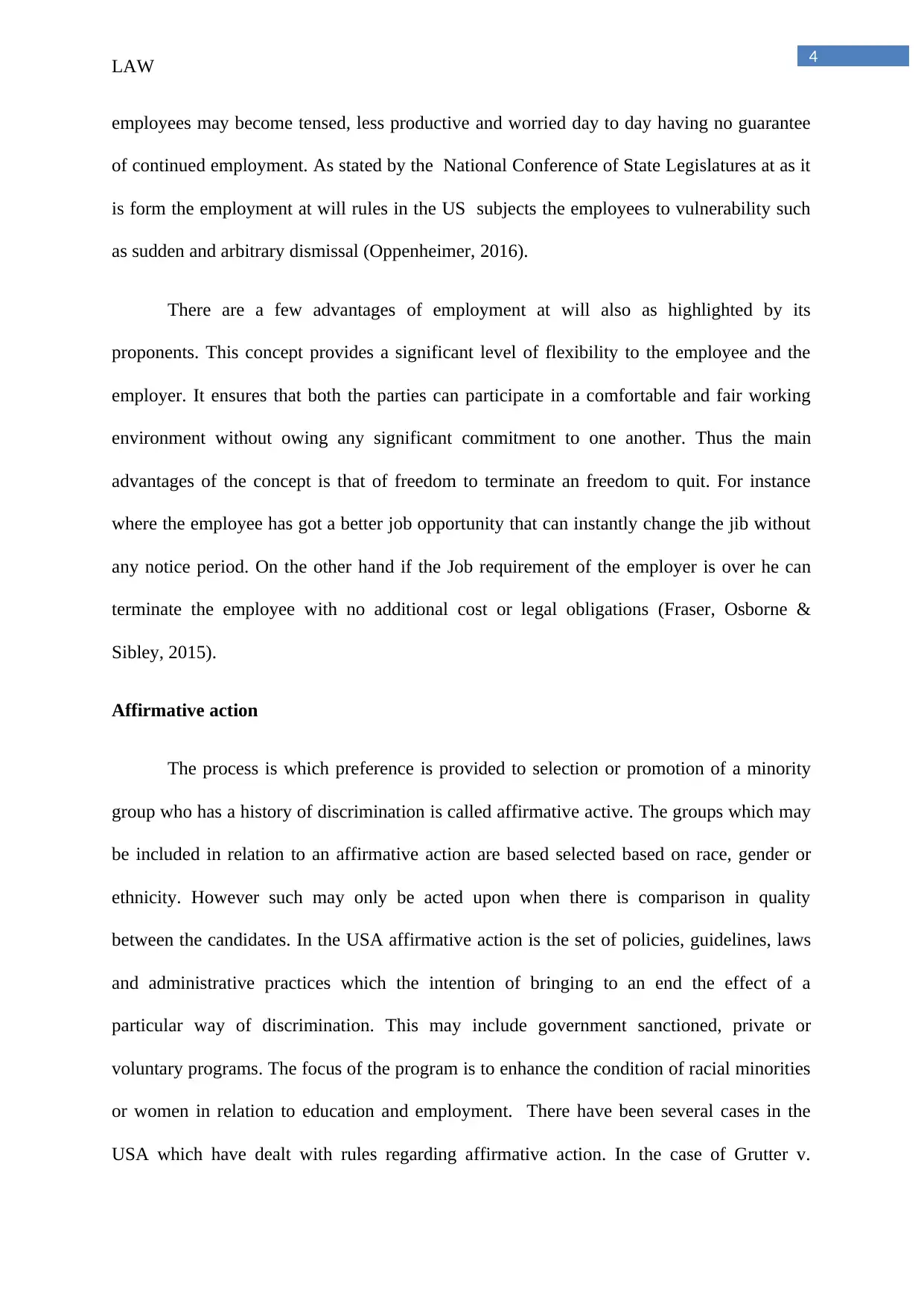
4
LAW
employees may become tensed, less productive and worried day to day having no guarantee
of continued employment. As stated by the National Conference of State Legislatures at as it
is form the employment at will rules in the US subjects the employees to vulnerability such
as sudden and arbitrary dismissal (Oppenheimer, 2016).
There are a few advantages of employment at will also as highlighted by its
proponents. This concept provides a significant level of flexibility to the employee and the
employer. It ensures that both the parties can participate in a comfortable and fair working
environment without owing any significant commitment to one another. Thus the main
advantages of the concept is that of freedom to terminate an freedom to quit. For instance
where the employee has got a better job opportunity that can instantly change the jib without
any notice period. On the other hand if the Job requirement of the employer is over he can
terminate the employee with no additional cost or legal obligations (Fraser, Osborne &
Sibley, 2015).
Affirmative action
The process is which preference is provided to selection or promotion of a minority
group who has a history of discrimination is called affirmative active. The groups which may
be included in relation to an affirmative action are based selected based on race, gender or
ethnicity. However such may only be acted upon when there is comparison in quality
between the candidates. In the USA affirmative action is the set of policies, guidelines, laws
and administrative practices which the intention of bringing to an end the effect of a
particular way of discrimination. This may include government sanctioned, private or
voluntary programs. The focus of the program is to enhance the condition of racial minorities
or women in relation to education and employment. There have been several cases in the
USA which have dealt with rules regarding affirmative action. In the case of Grutter v.
LAW
employees may become tensed, less productive and worried day to day having no guarantee
of continued employment. As stated by the National Conference of State Legislatures at as it
is form the employment at will rules in the US subjects the employees to vulnerability such
as sudden and arbitrary dismissal (Oppenheimer, 2016).
There are a few advantages of employment at will also as highlighted by its
proponents. This concept provides a significant level of flexibility to the employee and the
employer. It ensures that both the parties can participate in a comfortable and fair working
environment without owing any significant commitment to one another. Thus the main
advantages of the concept is that of freedom to terminate an freedom to quit. For instance
where the employee has got a better job opportunity that can instantly change the jib without
any notice period. On the other hand if the Job requirement of the employer is over he can
terminate the employee with no additional cost or legal obligations (Fraser, Osborne &
Sibley, 2015).
Affirmative action
The process is which preference is provided to selection or promotion of a minority
group who has a history of discrimination is called affirmative active. The groups which may
be included in relation to an affirmative action are based selected based on race, gender or
ethnicity. However such may only be acted upon when there is comparison in quality
between the candidates. In the USA affirmative action is the set of policies, guidelines, laws
and administrative practices which the intention of bringing to an end the effect of a
particular way of discrimination. This may include government sanctioned, private or
voluntary programs. The focus of the program is to enhance the condition of racial minorities
or women in relation to education and employment. There have been several cases in the
USA which have dealt with rules regarding affirmative action. In the case of Grutter v.
Paraphrase This Document
Need a fresh take? Get an instant paraphrase of this document with our AI Paraphraser
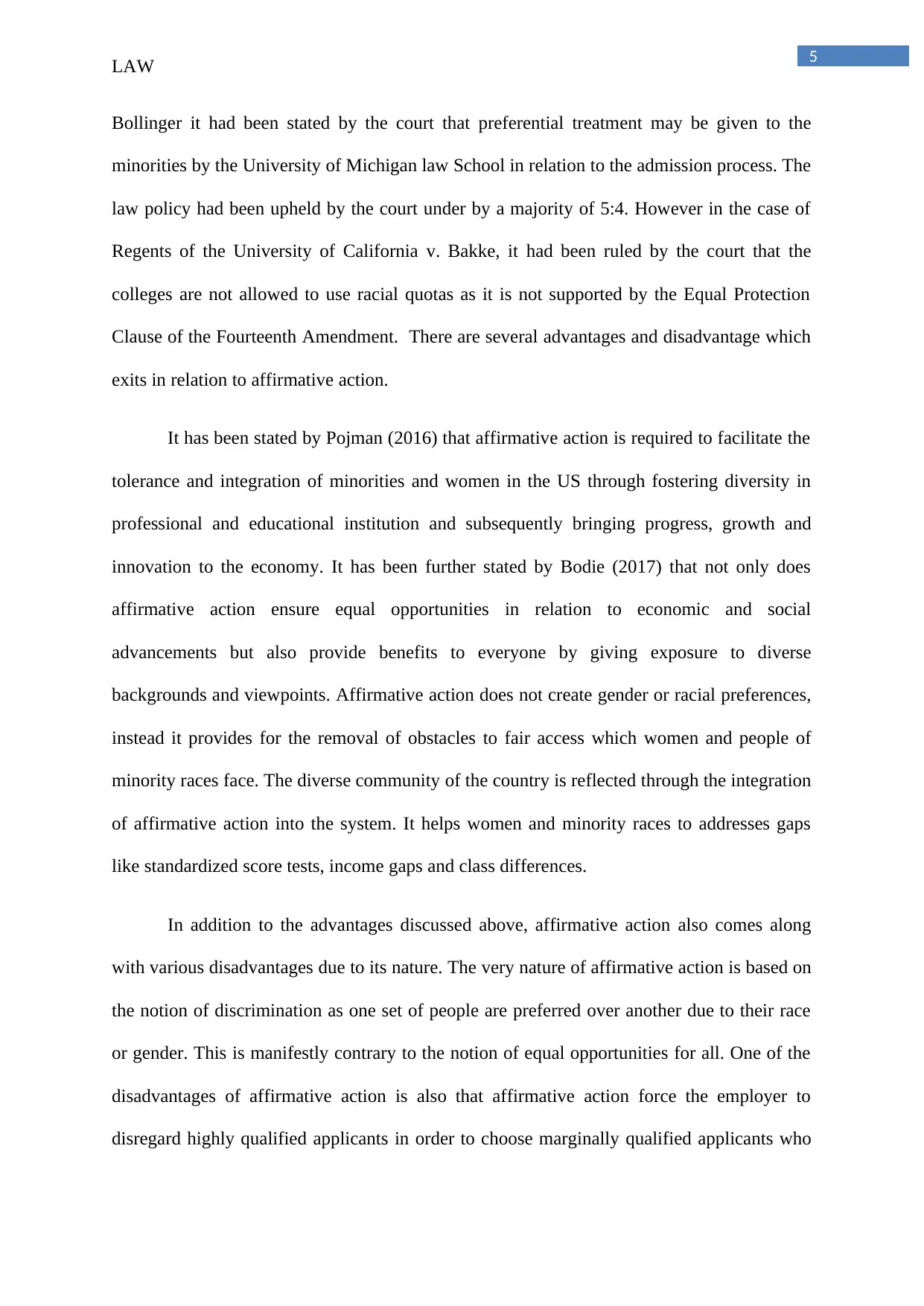
5
LAW
Bollinger it had been stated by the court that preferential treatment may be given to the
minorities by the University of Michigan law School in relation to the admission process. The
law policy had been upheld by the court under by a majority of 5:4. However in the case of
Regents of the University of California v. Bakke, it had been ruled by the court that the
colleges are not allowed to use racial quotas as it is not supported by the Equal Protection
Clause of the Fourteenth Amendment. There are several advantages and disadvantage which
exits in relation to affirmative action.
It has been stated by Pojman (2016) that affirmative action is required to facilitate the
tolerance and integration of minorities and women in the US through fostering diversity in
professional and educational institution and subsequently bringing progress, growth and
innovation to the economy. It has been further stated by Bodie (2017) that not only does
affirmative action ensure equal opportunities in relation to economic and social
advancements but also provide benefits to everyone by giving exposure to diverse
backgrounds and viewpoints. Affirmative action does not create gender or racial preferences,
instead it provides for the removal of obstacles to fair access which women and people of
minority races face. The diverse community of the country is reflected through the integration
of affirmative action into the system. It helps women and minority races to addresses gaps
like standardized score tests, income gaps and class differences.
In addition to the advantages discussed above, affirmative action also comes along
with various disadvantages due to its nature. The very nature of affirmative action is based on
the notion of discrimination as one set of people are preferred over another due to their race
or gender. This is manifestly contrary to the notion of equal opportunities for all. One of the
disadvantages of affirmative action is also that affirmative action force the employer to
disregard highly qualified applicants in order to choose marginally qualified applicants who
LAW
Bollinger it had been stated by the court that preferential treatment may be given to the
minorities by the University of Michigan law School in relation to the admission process. The
law policy had been upheld by the court under by a majority of 5:4. However in the case of
Regents of the University of California v. Bakke, it had been ruled by the court that the
colleges are not allowed to use racial quotas as it is not supported by the Equal Protection
Clause of the Fourteenth Amendment. There are several advantages and disadvantage which
exits in relation to affirmative action.
It has been stated by Pojman (2016) that affirmative action is required to facilitate the
tolerance and integration of minorities and women in the US through fostering diversity in
professional and educational institution and subsequently bringing progress, growth and
innovation to the economy. It has been further stated by Bodie (2017) that not only does
affirmative action ensure equal opportunities in relation to economic and social
advancements but also provide benefits to everyone by giving exposure to diverse
backgrounds and viewpoints. Affirmative action does not create gender or racial preferences,
instead it provides for the removal of obstacles to fair access which women and people of
minority races face. The diverse community of the country is reflected through the integration
of affirmative action into the system. It helps women and minority races to addresses gaps
like standardized score tests, income gaps and class differences.
In addition to the advantages discussed above, affirmative action also comes along
with various disadvantages due to its nature. The very nature of affirmative action is based on
the notion of discrimination as one set of people are preferred over another due to their race
or gender. This is manifestly contrary to the notion of equal opportunities for all. One of the
disadvantages of affirmative action is also that affirmative action force the employer to
disregard highly qualified applicants in order to choose marginally qualified applicants who
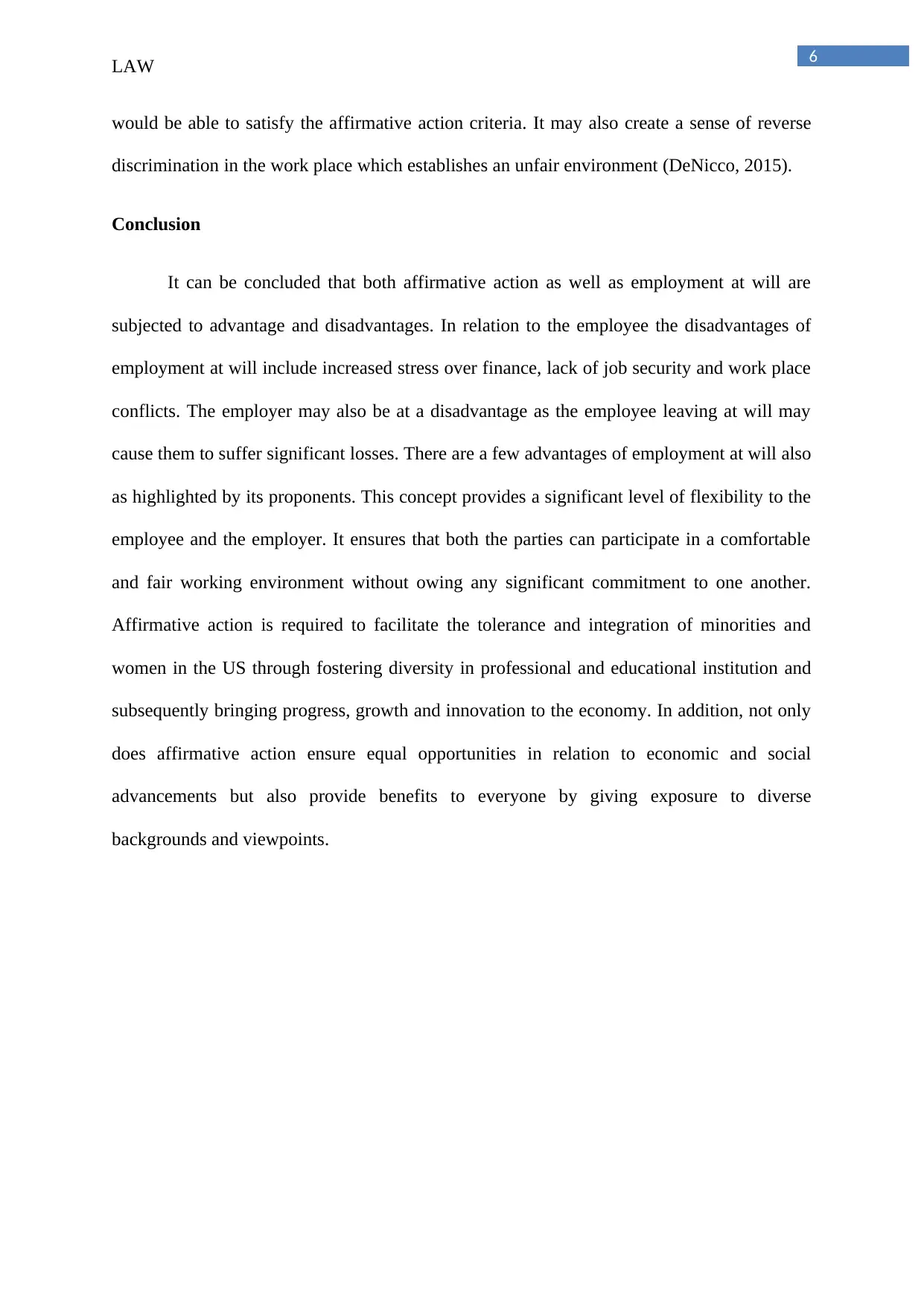
6
LAW
would be able to satisfy the affirmative action criteria. It may also create a sense of reverse
discrimination in the work place which establishes an unfair environment (DeNicco, 2015).
Conclusion
It can be concluded that both affirmative action as well as employment at will are
subjected to advantage and disadvantages. In relation to the employee the disadvantages of
employment at will include increased stress over finance, lack of job security and work place
conflicts. The employer may also be at a disadvantage as the employee leaving at will may
cause them to suffer significant losses. There are a few advantages of employment at will also
as highlighted by its proponents. This concept provides a significant level of flexibility to the
employee and the employer. It ensures that both the parties can participate in a comfortable
and fair working environment without owing any significant commitment to one another.
Affirmative action is required to facilitate the tolerance and integration of minorities and
women in the US through fostering diversity in professional and educational institution and
subsequently bringing progress, growth and innovation to the economy. In addition, not only
does affirmative action ensure equal opportunities in relation to economic and social
advancements but also provide benefits to everyone by giving exposure to diverse
backgrounds and viewpoints.
LAW
would be able to satisfy the affirmative action criteria. It may also create a sense of reverse
discrimination in the work place which establishes an unfair environment (DeNicco, 2015).
Conclusion
It can be concluded that both affirmative action as well as employment at will are
subjected to advantage and disadvantages. In relation to the employee the disadvantages of
employment at will include increased stress over finance, lack of job security and work place
conflicts. The employer may also be at a disadvantage as the employee leaving at will may
cause them to suffer significant losses. There are a few advantages of employment at will also
as highlighted by its proponents. This concept provides a significant level of flexibility to the
employee and the employer. It ensures that both the parties can participate in a comfortable
and fair working environment without owing any significant commitment to one another.
Affirmative action is required to facilitate the tolerance and integration of minorities and
women in the US through fostering diversity in professional and educational institution and
subsequently bringing progress, growth and innovation to the economy. In addition, not only
does affirmative action ensure equal opportunities in relation to economic and social
advancements but also provide benefits to everyone by giving exposure to diverse
backgrounds and viewpoints.
⊘ This is a preview!⊘
Do you want full access?
Subscribe today to unlock all pages.

Trusted by 1+ million students worldwide
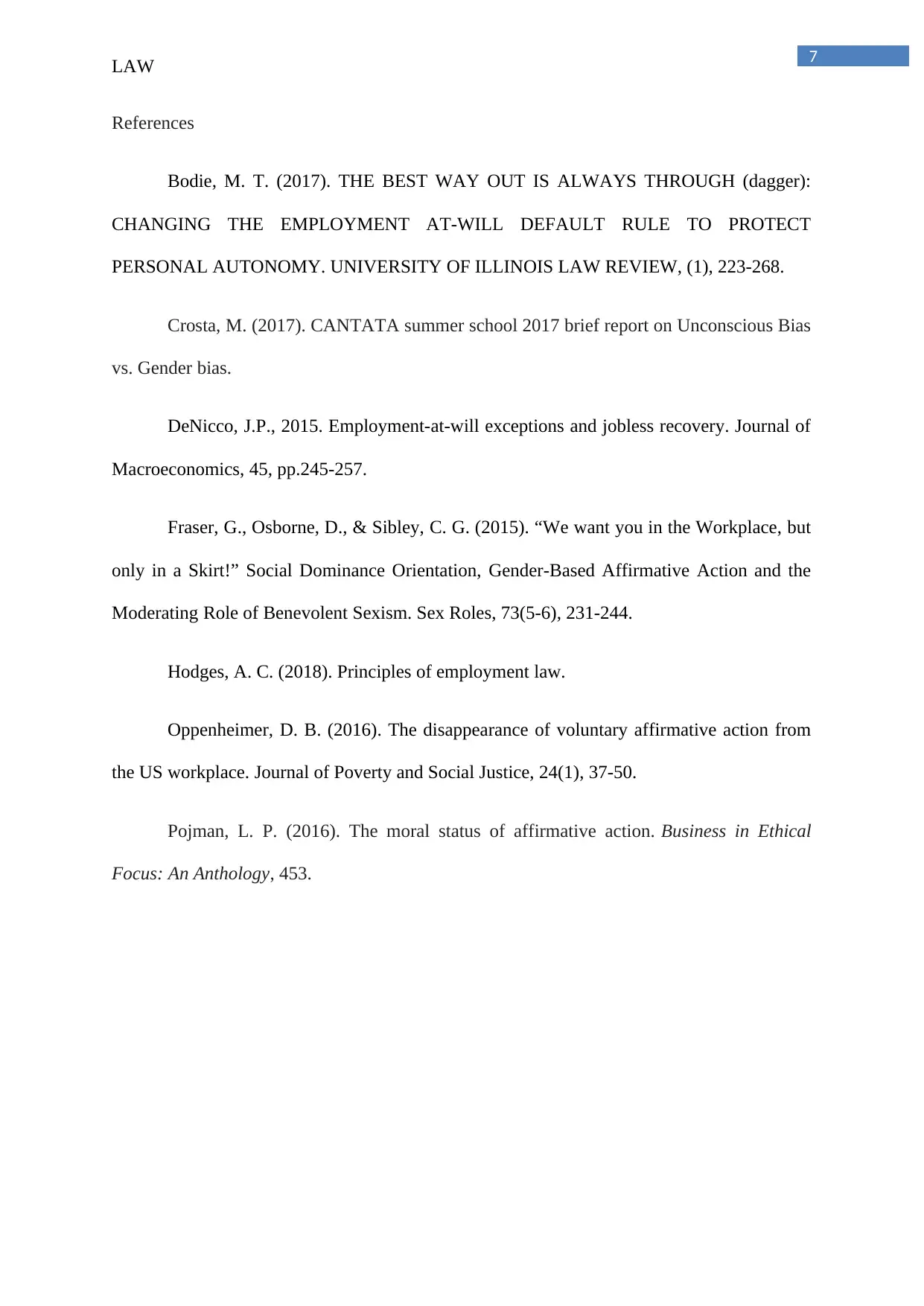
7
LAW
References
Bodie, M. T. (2017). THE BEST WAY OUT IS ALWAYS THROUGH (dagger):
CHANGING THE EMPLOYMENT AT-WILL DEFAULT RULE TO PROTECT
PERSONAL AUTONOMY. UNIVERSITY OF ILLINOIS LAW REVIEW, (1), 223-268.
Crosta, M. (2017). CANTATA summer school 2017 brief report on Unconscious Bias
vs. Gender bias.
DeNicco, J.P., 2015. Employment-at-will exceptions and jobless recovery. Journal of
Macroeconomics, 45, pp.245-257.
Fraser, G., Osborne, D., & Sibley, C. G. (2015). “We want you in the Workplace, but
only in a Skirt!” Social Dominance Orientation, Gender-Based Affirmative Action and the
Moderating Role of Benevolent Sexism. Sex Roles, 73(5-6), 231-244.
Hodges, A. C. (2018). Principles of employment law.
Oppenheimer, D. B. (2016). The disappearance of voluntary affirmative action from
the US workplace. Journal of Poverty and Social Justice, 24(1), 37-50.
Pojman, L. P. (2016). The moral status of affirmative action. Business in Ethical
Focus: An Anthology, 453.
LAW
References
Bodie, M. T. (2017). THE BEST WAY OUT IS ALWAYS THROUGH (dagger):
CHANGING THE EMPLOYMENT AT-WILL DEFAULT RULE TO PROTECT
PERSONAL AUTONOMY. UNIVERSITY OF ILLINOIS LAW REVIEW, (1), 223-268.
Crosta, M. (2017). CANTATA summer school 2017 brief report on Unconscious Bias
vs. Gender bias.
DeNicco, J.P., 2015. Employment-at-will exceptions and jobless recovery. Journal of
Macroeconomics, 45, pp.245-257.
Fraser, G., Osborne, D., & Sibley, C. G. (2015). “We want you in the Workplace, but
only in a Skirt!” Social Dominance Orientation, Gender-Based Affirmative Action and the
Moderating Role of Benevolent Sexism. Sex Roles, 73(5-6), 231-244.
Hodges, A. C. (2018). Principles of employment law.
Oppenheimer, D. B. (2016). The disappearance of voluntary affirmative action from
the US workplace. Journal of Poverty and Social Justice, 24(1), 37-50.
Pojman, L. P. (2016). The moral status of affirmative action. Business in Ethical
Focus: An Anthology, 453.
1 out of 7
Related Documents
Your All-in-One AI-Powered Toolkit for Academic Success.
+13062052269
info@desklib.com
Available 24*7 on WhatsApp / Email
![[object Object]](/_next/static/media/star-bottom.7253800d.svg)
Unlock your academic potential
Copyright © 2020–2026 A2Z Services. All Rights Reserved. Developed and managed by ZUCOL.





